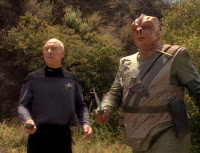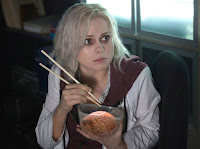I’m sorry this is a bit late. Well, four weeks late. That’s not a bit, that’s crazy-late. I’m in the final weeks for this manuscript and I’m really trying to make it fantastic. That’s pretty much been my main focus the past month or so, for what I hope are obvious reasons.
Hey, speaking of which…
One of the most common things that makes a character unbelievable is when they have no purpose for their actions. We’ve all seen it. The guy who decides to pick a fight over something petty in the middle of a crisis. The person in charge who continues to ignore someone with key information. The spouse who’s just a jerk. The ninja who attacks for no reason.
Nothing knocks a reader out of a story faster than people just randomly doing stuff. There’s a simple reason for this. In the real world, when people do things for no reason, they’re usually considered to be insane. Not an interesting insane, either, but the “lame motivational excuse” insane. If I run into a burning house to save a baby or a dog, I’m going to be considered a hero whether I make it out or not. If I run into the flaming house just because it’s there, I’m going to be considered an idiot.
 People need a reason to do things. Real reasons. Reasons that jibe with their background and their personality and with basic rules of behavior. That’s why you’ve heard of people motivating horses with a carrot on a stick but not with a t-bone steak on a stick—horses like veggies, not meat. In Raiders of the Lost Ark, it’s completely understandable that Belloq wants to open the Ark before taking it to Germany, and believable that the Nazi officers would feel uncomfortable about performing a “Jewish ceremony.” This fits with Belloq’s smarmy background and it makes sense—historically, even—that the officers would be a bit by disturbed by what needs to be done to open the Ark.
People need a reason to do things. Real reasons. Reasons that jibe with their background and their personality and with basic rules of behavior. That’s why you’ve heard of people motivating horses with a carrot on a stick but not with a t-bone steak on a stick—horses like veggies, not meat. In Raiders of the Lost Ark, it’s completely understandable that Belloq wants to open the Ark before taking it to Germany, and believable that the Nazi officers would feel uncomfortable about performing a “Jewish ceremony.” This fits with Belloq’s smarmy background and it makes sense—historically, even—that the officers would be a bit by disturbed by what needs to be done to open the Ark.
So here’s a challenge for you—try to picture that scene reversed. Imagine if, at that point in the film, the Nazi colonel was insistent on performing the ceremony and Belloq said “no, no, I really think we should just take it to der Fuhrer and let him deal with it…” It wouldn’t make any sense, would it?
In the big scheme of things, most people’s motivations tend to be simple. If you’ve ever seen a procedural show, they often talk about the common motives for murder. Love, money, revenge—they’re very basic ideas. The unspoken motive for the investigators on these shows is justice, or perhaps closure. In Raiders, Belloq is looking for glory and maybe a bit of power (I think it’s safe to say he was secretly hoping he’d get all the benefits of that “hotline to God”). Indy wants to stop the Nazis and save the Ark for a museum. The Nazis want to obey the orders from their commander.
In the book I’m working on right now, a major motive for the main character is infatuation. It’s why he takes the actions he does that kick off the story. But not very far in, fear and survival become big motivators for him. His actions might not always be rational, mind you, but his actions fit who he is and what he thinks he can accomplish.
Now, sometimes the story needs people to act a certain way. It’s been plotted out and the characters need to do this now so that can happen later. What some writers don’t seem to get is that this need doesn’t make a character’s actions more believable or forgivable.
The reader has to be able to relate to my character’s purpose for doing things. While characters might have very true and proper motivations within the context of their tale, those motivations still need to be interpreted by the chosen audience. This is especially important for stories set in different cultures (Japan, for example, or India under the caste system) or perhaps in entirely fictitious ones (Barsoom, Diagon Alley, or the grim darkness of the future). It’s common to hit this wall when the writer knows their chosen setting too well, or maybe had to build it from the ground up. To me, it’s completely clear and understandable why a Thark warrior would act this way—why waste time going over it, right? To you, though… this may not be so clear.
Let me toss out one other thought about motivations. Up top I gave a list of situations that many of us have probably dealt with. The random aggressive person. The jerk spouse/boyfriend/girlfriend. The willfully ignorant boss. These people really exist. Hell, I had that higher-up boss for two years at one point.
But…
As I’ve said here many times, reality is not a story point. It’s not part of a character sketch, either. Once I put that boss into a story, my readers are going to expect there’s a purpose to him being there. That there’s an actual reason for his behavior. And if there isn’t… that’s on me as the writer.
Look at the characters in your story. Follow them for a few pages. Can you explain their actions with one or two simple words? Are they words most people will know? Do these words relate to the character and not my outline?
Then you’ve probably got some very driven characters.
I’m not sure I’ll be able to post anything next week because I’m a “special guest” at WonderCon here in Los Angeles. And I’ll be in the last two weeks before this new book is due.
Or maybe I’ll just stop making excuses and write something.
Until then… well, hopefully you feel motivated to go write.









